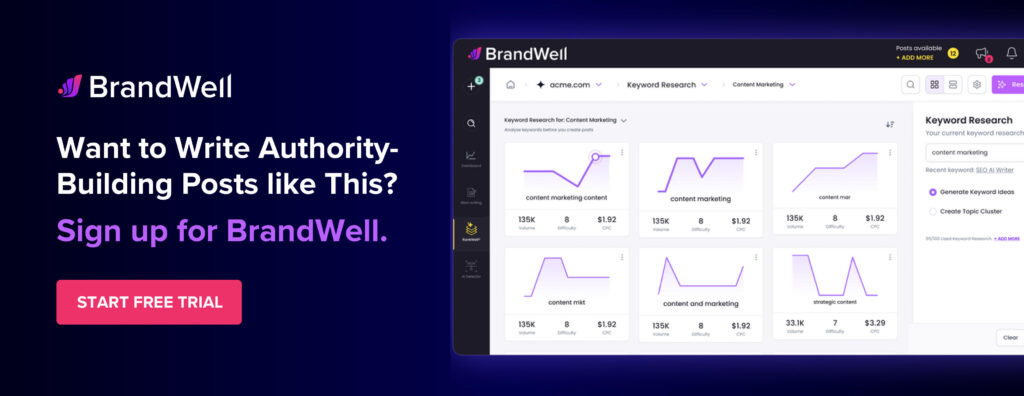Discover top guides, trends, tips and expertise from AIO Writers
Keyword Opportunity: How to Maximize Your SEO Potential
Julia McCoy
Sunday, 7th Jul 2024
Whether you’re an independent blogger, an e-commerce store owner, or a seasoned SEO pro, you know that organic traffic is the lifeblood of any website. And how do you tap into that traffic goldmine? By identifying and capitalizing on keyword opportunities.
That’s right, unearthing those valuable keywords that are just waiting to be optimized for better rankings and increased visibility.
It’s a simple process, really.
Identify the terms people use when searching for information related to your niche. Then, tailor your content to not only rank well for those keywords but to also provide genuinely helpful information that answers searchers’ questions.
That is the essence of keyword opportunity.
Now let me show you how to find these golden keywords and use them to improve your website’s visibility to drive more targeted traffic.
Table Of Contents:
What is a Keyword Opportunity?
At its core, a keyword opportunity is a specific keyword or phrase that has the potential to bring in a significant amount of targeted traffic to your website.
A keyword opportunity represents a sweet spot: high search volume (people are actively looking for information using that term) paired with low competition (you can easily rank for that term).
You can view these metrics when you run a term through a keyword research tool, like this one from BrandWell:
Think of keyword research as finding a hidden treasure chest of organic traffic that’s just waiting to be unlocked. It’s important to stay on top of keyword research because trends change, and new opportunities are constantly emerging.
Why is Keyword Opportunity So Important for SEO?
Search engine optimization (SEO) is all about understanding how people find information online. People go to places like Google Search and type in their questions or phrases. When they do that, search engines scour their massive databases for the content that best matches those search queries.
That’s why aligning your content with relevant keyword opportunities is crucial for improving your website’s visibility. This will help you drive organic traffic, and ultimately, achieve your SEO goals. It’s like building a bridge between what people are searching for and the valuable information you offer.
Google makes it pretty clear: websites providing the most useful content get preferential treatment. This is why keyword discovery is an ongoing process that involves consistently researching and adapting your keyword strategy.
How to Identify and Capitalize on Keyword Opportunities
Ready to unearth some keyword opportunities that will take your SEO strategy to the next level?
Here’s how you can get started:
1. Understand Your Niche and Audience
The journey to unlocking amazing keyword opportunities starts with understanding your target audience and niche.
Ask yourself, what are the core topics, themes, and areas of interest related to your website or business?
This sets the foundation for your keyword research and ensures you’re targeting the right people with your content.
Don’t be afraid to dive deep into what makes your audience tick – their interests, pain points, and the language they use.
2. Conduct Thorough Keyword Research
Here’s where things get really interesting. Tools like BrandWell and Google’s Keyword Planner are indispensable for gathering keyword ideas and analyzing search volume.
Google’s tool in particular is a gem; it tells you how many searches a keyword gets per month, which is your monthly search volume.
Don’t stop there though; use a tool like AnswerThePublic to unearth those valuable long-tail keywords that go beyond those generic search terms.
These question-format keyphrases often have lower competition but a more specific search intent.
3. Analyze the Competition
It’s always smart to learn from those already crushing it in your industry, right? This involves identifying the keywords that your competitors are targeting and how well their content performs.
It’s like scoping out the opponent before a big game; knowing their strengths and weaknesses helps you strategize.
Tools like Semrush and Ahrefs make this super easy by automatically listing some of your main organic competitors. Look into their domain authority, backlink profile, and the quality of their content.
4. Run a Content Gap Analysis
The goal of a content gap analysis is to uncover opportunities to create new content that addresses unmet needs, improves SEO, and enhances user engagement.
You can use a tool like Ahrefs and generate a Content Gap report to compare your domain with those of your top competitors. The tool will then reveal keyword opportunities that your competitors are ranking for while you’re missing out.
Let’s say you discover your competitors are outranking you for a keyword like “best running shoes for flat feet”.
That’s a content gap screaming for your attention! Consider creating high-quality, informative content around that keyword phrase.
You can even take it a step further and analyze the top-ranking pages for that keyword.
What are your competitors doing well? What can you improve upon? This type of competitive intelligence can give you an edge in the search results.
Don’t forget to look beyond just single keywords. Content gap analysis can also uncover entire topic clusters your competitors are dominating. By identifying these gaps, you can create a content strategy that fills those voids and establishes your authority in your niche.
You can run a topic report through BrandWell to find content gaps. Watch this video to learn how:
5. Find Keywords That Forums Rank For
Ever notice how forum posts sometimes pop up high in Google’s search results?
You might think, “How can a random forum thread outrank authoritative websites?”
This presents a golden keyword opportunity.
Google’s algorithm prioritizes content that best answers a user’s search intent. Since forum threads are often filled with real people asking and answering specific questions, they sometimes provide more direct and relevant information than even the most well-written articles.
When a forum post ranks well for a keyword, it often indicates an excellent opportunity to create high-quality content around that topic.
Think of it this way: if a forum thread with scattered information can reach the top, imagine what a well-structured article targeting that same keyword can achieve.
Here’s how to uncover these hidden keyword gems:
- Identify relevant forums: Begin by searching Google for forums related to your niche. For instance, if your website focuses on running shoes, search for “fashion forums” or “retail forums.”
- Analyze forum threads: Explore these forums and look for active threads with significant engagement (replies, views). Pay attention to the specific language and keywords used in both questions and answers.
- Analyze keyword metrics: Again, using a keyword research tool, look at the search volume and ranking difficulty of the terms you find within forum discussions.
Forums give you valuable insights into what your target audience is genuinely interested in and searching for online. This targeted approach allows you to craft content that directly addresses those needs, potentially leading to higher rankings and increased organic traffic to your website.
6. Find New Keywords in Google Search Console
Google Search Console (GSC) isn’t just for monitoring website health; it’s a goldmine of keyword insights!
GSC reveals what people actually type into Google to find your content, uncovering hidden keyword opportunities to drive more organic traffic to your site.
To use Google Search Console, go to the “Performance” report and click on the “Queries” tab. Here you will see a list of keywords your site ranks for, along with valuable metrics like clicks, impressions, click-through rate (CTR), and average position.
Don’t just skim the surface; sort by “Impressions” to prioritize keywords with high visibility but low clicks.
For example, let’s say you discover a keyword like “best running shoes for flat feet” with thousands of impressions but a low CTR. This indicates a prime opportunity to optimize your existing content or create a dedicated piece specifically targeting that keyword.
7. Use Keyword Opportunity Tools
Once you have a good grasp of potential keywords, use dedicated keyword opportunity tools to assess their true potential.
For newer websites, a tool like Little Warden can help uncover all kinds of golden keyword opportunities. For example, if Little Warden highlights technical issues on your site, you can identify specific keywords where your ranking might dramatically increase, should those issues be fixed.
8. Target Keywords Strategically
Spread your keywords across various types of content on your website, such as blog posts, product descriptions, or even your “About Us” page.
However, remember that keyword optimization is not all about rankings. The real power of targeting a keyword opportunity comes from aligning your content strategy with what your audience craves.
Incorporate these valuable keywords organically within your content and don’t force them where they don’t belong as this can harm your SEO.
Search engine optimization is about two things: providing fantastic content people want to read and making it easily discoverable.
Provide exceptional value and answer their questions in a helpful, informative, and engaging manner.
This will go a long way in satisfying Google’s algorithms, establishing your website’s expertise and trustworthiness, and ultimately boosting your search rankings.
Conclusion
Finding keyword opportunities is essential to a successful SEO strategy. It’s more than just identifying and targeting specific phrases. It’s about truly understanding the needs and desires of your target audience and how you can meet them.
Don’t fall for shortcuts like keyword stuffing. Prioritize building authentic relationships with your readers by consistently providing valuable, high-quality content.
With the right strategy, keyword opportunity opens the floodgates to increased organic traffic, improved search rankings, and greater visibility for your website or business.

UNLOCK YOUR POTENTIAL
Long Headline that highlights Value Proposition of Lead Magnet
Grab a front row seat to our video masterclasses, interviews, case studies, tutorials, and guides.



